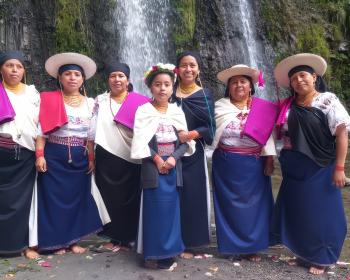Cultural Survival was fortunate to have three Shuar visitors in February from the Ecuadorian Amazon. Professor Basco Atamaint, National Executive Director of the Shuar Federation; Profesor Aurora Wamputsar, who works in bilingual Shuar education; and Kar Atamaint, a student at the Universidad San Francisco de Quito and also the leader and founder of the new Intercultural Dialogue Project, came to the Cultural Survival office in Cambridge to talk about the recent indigenous-led protests in Quito.
The Shuar Federation has been at the forefront of the indigenous peoples's movement in Ecuador. Historically one of the most organized and active forces among the indigenous peoples in Ecuador, the Federation has, since its establishment in 1964, been involved in such diverse projects as bilingual education, baptizing children with Shuar names instead of Spanish ones, communitybased health care efforts, and a Shuar-led radio station. Working with CONAIE, the pan-Ecuadorian indigenous organizaton, many Shuar have been particularly vocal and active in the recent protests. These protests centered around the issue of the rise in cooking oil prices -- one of the measures required of the government for the deployment of some international aid to Ecuador -- which most severely affected the poorest residents of Ecuador, mainly the indigenous peoples. Highland and lowland Indians joined together in Quito to protest this rise in prices, nearly immobilizing the city, and, through a dialogue with the government, leading to the lowering of oil prices.
In addition to discussing the recent protests, the Shuar visitors also unveiled a plan for a new "intercultural dialogue" project, which seeks to unite indigenous, mestizo, black, and other youth in dialogue and action, mainly through outreach efforts to Ecuadorian schools. "This is not only for the mestizos to learn about indigenous peoples," says leader Kar Atamaint, "this is also a chance for us to learn about them, and for us to learn about the different indigenous groups. Ecuador has many `colors.' This project wants to help each stand alone, but also to stand together in unity and understanding."
According to Professor Atamaint, this visit to Cultural Survival was very important, not only for the Shuar, but also for other indigenous peoples in Ecuador and throughout the world: "Too often indigenous groups and people have been represented and spoken for by others. I wanted to come here to show my face as an indigenous person. I paid my own way."
Article copyright Cultural Survival, Inc.


